|
|
|
Sort Order |
|
|
|
Items / Page
|
|
|
|
|
|
|
| Srl | Item |
| 1 |
ID:
128550
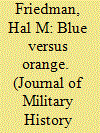

|
|
|
|
|
| Publication |
2014.
|
| Summary/Abstract |
In the fall of 1945, the United States Naval War College (NWC) began its transition from a reduced wartime status to a peacetime stance as the Navy's premier postgraduate school. Because the war ended so quickly, the NWC was not able to change its curriculum for 1945-1946, which had been planned the previous academic year. It is therefore not surprising to find that the primary supposed enemy for Blue (the United States) in the coming academic year was still Orange (Japan). This study looks at the Operations Problems simulated at the immediate end of the war and explores the mix of interwar and wartime doctrine that was employed to prepare for the early Cold War.
|
|
|
|
|
|
|
|
|
|
|
|
|
|
|
|
| 2 |
ID:
125040


|
|
|
|
|
| Publication |
2013.
|
| Summary/Abstract |
Despite its relative absence from much of the literature on politics in the Pacific region, religiosity is an assumed and often unchallenged component of political life. Drawing from more than 100 in-depth biographical interviews with politicians, around 40 published life histories and other publicly available material, this article uses Pierre Bourdieu's concept of 'habitus' to explore how politicians see the role of faith and religious association contributing to their public profile, election campaigning, representative and legislative functions, and 'inner' life. It advances two arguments: firstly, that ideal analytic distinctions like state, society and religion become problematic in the Pacific Islands where political leaders tend to occupy multiple roles and assume overlapping identities; and, secondly, that despite the overwhelming religiosity seemingly apparent in public rhetoric, secularization is an effervescent narrative across the region with politicians vocal protagonists on all sides of this debate.
|
|
|
|
|
|
|
|
|
|
|
|
|
|
|
|
| 3 |
ID:
073358
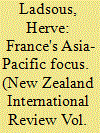

|
|
|
| 4 |
ID:
130916
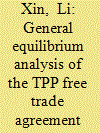

|
|
|
|
|
| Publication |
2014.
|
| Summary/Abstract |
The approaching tenth year of the Doha Round with no achievements to celebrate indicates a failure of the World Trade Organization. Formal negotiations of the Round expired in 2005 without reaching a consensus, and informal negotiations were stalled in 2008. Thus, the Trans-Pacific Partnership (TPP), a recent initiative to deepen trade relations among countries bordering the Pacific, was greeted with applause and relief as a step in the right direction. This article discusses the region-wide Free Trade Agreement series of linked agreements that cover various members and issues. The recursive dynamic computable general equilibrium (CGE) model simulates two scenarios against the baseline, namely, a TPP agreement with China and without China. The preliminary results show that the TPP agreement without China cannot change the significant roles of markets and geography as the principal factors behind the economic integration of Southeast Asia with China. Trade and investment agreements facilitate market forces, they do not oppose them. The integration of the Asia-Pacific countries may benefit the US and other key economies.
|
|
|
|
|
|
|
|
|
|
|
|
|
|
|
|
| 5 |
ID:
089824


|
|
|
|
|
| Publication |
2009.
|
| Summary/Abstract |
This article deals with the round table held at Victoria University of Wellington. The central themes of discussion were to focus on the need to rebalance the control of aid and other resource flows; to increase local ownership and management while decreasing the weight of foreign decision-making; to modify systems and processes to better accommodate local conditions to better accommodate local conditions and customary practice; and to reinforce the value of collective and regional approaches in overcoming the current problems of development across the Pacific.
|
|
|
|
|
|
|
|
|
|
|
|
|
|
|
|
| 6 |
ID:
139299
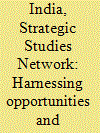

|
|
|
|
|
| Summary/Abstract |
Based on the work of the Maritime Security Working Group within the Strategic Studies Network (SSN), this report provides both diagnosis and prescriptions regarding security threats in the Indian Ocean Region (IOR). The IOR, a large maritime area that extends from coastal Africa through the Middle East and South Asia and on to Australia, is a major conduit for global trade, a littoral zone of developing powers, and the focus of a series of rising security challenges. Thus, not only is the security of the IOR of major importance for IOR littoral states, it is also of vital importance for much of landlocked Africa and Asia, along with major economic powers like China, the European Union and the United States.
This collaborative report highlights two overarching themes, the first being that the IOR, while of great importance to regional/global stability, needs to be conceived of as a key strategic zone. In short, security issues in the IOR must be addressed with a sense of urgency. The second theme is that this diverse region suffers from a lack of institutions capable of bridging gaps and easing tensions. The institutions that do exist are either ineffective or are of a very specific nature. Greater attention must be directed towards building shared perspectives on security issues, particularly as they relate to non-state or non-traditional threats.
This report reflects the desire of all participating experts in this Working Group to see comprehensive strategic assessments being developed within the global foreign policy community. Thus, this report is the start of strategic dialogues that hopefully will commence among IOR littoral states. The IOR is an essential conduit that draws in Europe, North America and the Asia-Pacific. It is too often conceived within the limitations of a sub-region (like South Asia, Eastern Africa or the Gulf). The IOR is full of threats, but it also offers attractive opportunities for enhancing global security. While the IOR’s littoral zones are often divided along national boundaries, the IOR is a huge maritime domain, where no single country can guarantee stability and where a maritime context may offer unique chances to bypass barriers inhibiting cooperation on land. The opportunity for enhancing security is there and it is hoped that this analysis can assist in the formation of policies that help all actors and nations.
|
|
|
|
|
|
|
|
|
|
|
|
|
|
|
|
| 7 |
ID:
179185
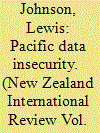

|
|
|
|
|
| Summary/Abstract |
Growing internet proliferation, data production and geopolitical competition in the Pacific region are increasing the vulnerability of Pacific Islands nations to foreign interference methodologies. Although no solution can completely eradicate the threat of foreign interference, reinforcing a nation's democratic institutions can make it a harder target to manipulate, and bolster its democracy. The relationship between data exploitation, foreign interference and national security; data privacy and protection legislation; possible changes to New Zealand's regional development outlook - all are matters of current concern. A wave of new data protection and privacy legislation is sweeping the globe, and the Pacific cannot be left behind.
|
|
|
|
|
|
|
|
|
|
|
|
|
|
|
|
| 8 |
ID:
171545
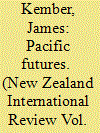

|
|
|
| 9 |
ID:
160609
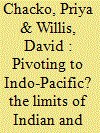

|
|
|
|
|
| Summary/Abstract |
Proponents of the Indo-Pacific concept assume that growing economic and societal linkages and the need for greater political and security cooperation and order-building are leading to the integration of the region. India and Indonesia were thought to be crucial in these processes of regionalisation and regionalism and were early adopters of the Indo-Pacific idea. The purpose of this paper is to evaluate the extent to which the Indo-Pacific initiatives of India and Indonesia are leading to the integration of the Asia-Pacific and Indian Ocean regions through greater Indian involvement with the Pacific region and stronger Indonesian engagement with the Indian Ocean region. It is argued that an interlinked set of security and economic concerns drove India and Indonesia’s adoption of the Indo-Pacific idea. In both cases, a desire for economic growth and preventing Chinese economic and political dominance in the region were important drivers. However, the nature of the political economies of India and Indonesia does not readily facilitate extensive economic linkages or strategic interests beyond their immediate regions. Moreover, both countries are wary of being seen as members of anti-China coalitions due to the impact this may have on regional stability and their domestic political and economic priorities. These factors place significant limitations on the regional integration of the Indo-Pacific.
|
|
|
|
|
|
|
|
|
|
|
|
|
|
|
|
| 10 |
ID:
109262
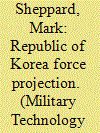

|
|
|
| 11 |
ID:
163468


|
|
|
|
|
| Summary/Abstract |
While international and Pacific scholarship suggests that communities can play a significant role in improving access to schooling as well as school funding, infrastructure, and resources, there is little research on how school-community relations shape the implementation of fee-free education policies. This is particularly the case in the Pacific region. In Papua New Guinea, communities play a significant role in determining school funding, infrastructure, and access, but their role in implementing the country's fee-free education policy (introduced in 2012) is poorly understood. Drawing on data from two provinces with very different capacities for service delivery, this paper shows that school-community relations vary significantly, and are crucial for managing challenges associated with the country's tuition fee-free (TFF) policy, particularly in regards to access to schooling and improving school funding, infrastructure, and resources. While communities have helped advance the TFF policy's goals, conflict over land, the charging of fees, and the board of management (BOM)—a key local governance body—has, in some cases, undermined national efforts to increase enrollments and make up for the loss of school income from tuition fees. This paper argues that academics and policy makers need to pay greater attention to the sustainability of fee-free education policies, geographical variation, and the improvement of school-community relations. Doing so will require overcoming the tendency to focus on national-level indicators of success associated with fee-free education policies.
|
|
|
|
|
|
|
|
|
|
|
|
|
|
|
|
| 12 |
ID:
139292
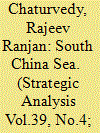

|
|
|
|
|
| Summary/Abstract |
This article looks at India’s interests and strategy in the South China Sea (SCS). First, it highlights India’s maritime interests and discusses the relevance of the SCS to these interests. It then examines some key ingredients of India’s evolving policy initiatives in the region. The article argues that with a considerable expansion of India’s engagement with the South China Sea littoral states, India appears to be genuinely emerging as an indispensable element in the strategic discourse of this region. India could be a valuable security partner for several nations in the Asia Pacific region, provided it sustains a high economic growth rate and nurtures the framework of partnership that it has enunciated in the region.
|
|
|
|
|
|
|
|
|
|
|
|
|
|
|
|
| 13 |
ID:
171608
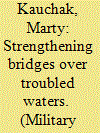

|
|
|
| 14 |
ID:
188799
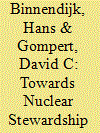

|
|
|
|
|
| Summary/Abstract |
With the rising risk of complex crises and military escalation in the Pacific region, the United States should invite China into a process of nuclear restraint and confidence-building, which we call ‘nuclear stewardship’. This process could start with a joint bilateral declaration that neither superpower would use nuclear weapons first against the other or its formal allies. This would acknowledge that neither side could gain by striking first with a nuclear device. This declaration could be the leading edge of a broader set of discussions on strategic stability and eventual implementation of confidence-building measures designed to enhance mutual understanding and trust in the US–Chinese nuclear relationship.
|
|
|
|
|
|
|
|
|
|
|
|
|
|
|
|
| 15 |
ID:
128662
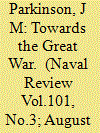

|
|
|
|
|
| Publication |
2013.
|
| Summary/Abstract |
A century ago, in August 1913, the Commander in Chief, China Station was Vice Admiral Martyn Jerram. From England via the Atlantic, North America and the Pacific he had arrived at Hong Kong from Vancouver on 14 March 1913 in the CPR steamer empress of India (5,943 grt). There, on 29 March 1913, he assumed command of the station in succession to Admiral Sir Alfred Winsloe who on that day sailed for England in the P and O SS India (7,911 grt.).As befits the era, the wade-Giles from Romanisation is used where relevant.
|
|
|
|
|
|
|
|
|
|
|
|
|
|
|
|
| 16 |
ID:
128811
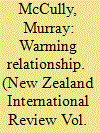

|
|
|
|
|
|
|
|